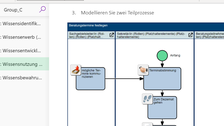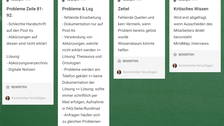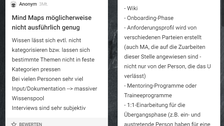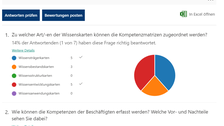Elective compulsory module ‘Knowledge Management’: Prof. Dr. Eric Schoop (#ES1)
Course for five Diplom and Master’s programs in the Faculty of Business and Economics and for incoming students (lecture in English, practicals in German and English)
Format
Virtual flipped classroom with the following components:
- Asynchronous individual study: Preparatory phases of (fundamental) knowledge acquisition via lectures in English and additional online materials (readings, links) for independent online study.
- Synchronous group study: Webinar in English every two weeks as a replacement for the seminars which normally take place on site (students worked in groups on academic articles and presented them for discussion in the seminar).
- Synchronous group study: Online practical in German every two weeks, alternating with the webinar. Using a comprehensive case study (knowledge management in a public authority), the students were introduced to methods of knowledge management and put these methods to the test in work groups. In the following semester, students applied the case study to a real-world scenario in a dedicated, hands-on project module.
- Asynchronous group study: Follow-up practical phases in German to consolidate the exercises on methodology and to document the results (e.g. on a wiki) in self-organized online work groups.
- Asynchronous individual study: Those studying in English wrote an assignment in English on application issues in knowledge management as an alternative to the practical in German.
Keywords
Knowledge management (subject area), flipped classroom (didactic structure), academic publications (webinar scenario), case study work (practical scenario), ability to work in a team (learning objective)
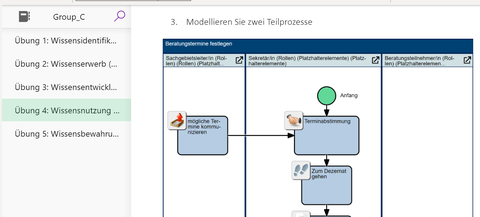
© Eric Schoop
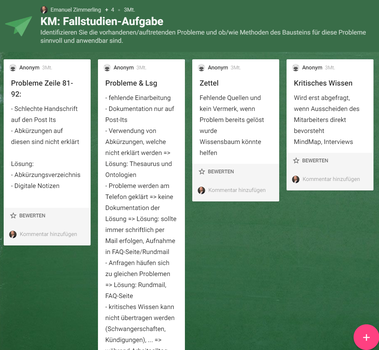
© Eric Schoop
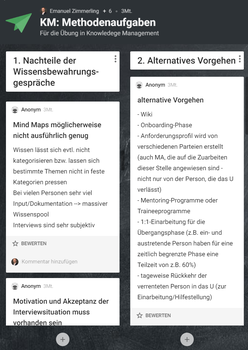
© Eric Schoop
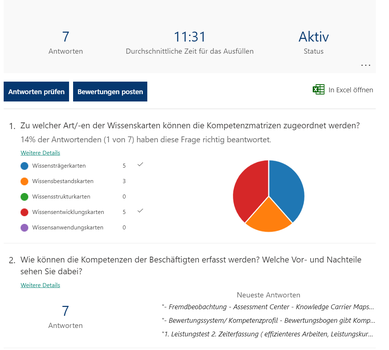
© Eric Schoop
Description
Knowledge management offers an interdisciplinary perspective (e.g. based in socio-economics, psychology, process design and information technology) on business and learning processes within organizations. Students of the advanced master's degree or diplom program in Economics acquire competencies in various areas that answer the questions:
- How can organizations be developed into learning organizations?
- What are the requirements for knowledge management?
- What are the barriers to acquiring knowledge? How can these be overcome?
- How can organizational learning be encouraged (in the sense of being flexible in the face of constantly changing surrounding influences)?
Didactically, the module focused on the transition from traditional lecture formats, where information is read out, to digitally supported learning via independent study, followed by knowledge consolidation through group work. In 2020, during the pandemic, the on-site seminars were converted to a synchronous webinar format. Students presented a summary of an academic paper to the class and then discussed this as a group, according to the basic building blocks of knowledge management, as defined by Probst et al. After consolidating their theoretical knowledge in the online seminars, students worked in groups to learn more about and apply practical methods of knowledge management to a comprehensive case study.
The students received their own Microsoft Teams accounts during this course. This afforded them the chance to use an integrated group work software that is a common business standard (relevant for students of Business and Economics). This allowed them to participate in the webinars and take full advantage of the Microsoft 365 cloud suite for their group interactions (SharePoint and OneNote Server, Word, Excel, PowerPoint, Planner, and any other easily embedded tools and apps). MS Teams runs on German servers and thus complies with the German General Data Protection Regulations and, thanks to its intelligent integration concept, means the students do not have to resort to external applications such as WhatsApp, Facebook, Google Docs, DropBox or the like to collaborate, as is otherwise frequently the case.
Contact
Online lecture: Prof. Dr. Eric Schoop
Online seminar: Prof. Dr. Eric Schoop
Practical: M. Sc. Emanuel Zimmerling, M. Sc. Samuel Reeb
Voting ID
#ES1

